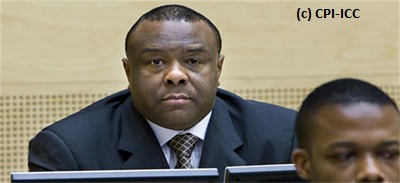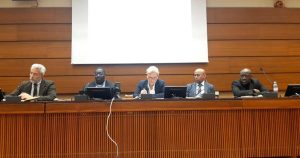Alison Smith, 13 June 2018
On 21 June 2016, Jean-Pierre Bemba, President of the Mouvement de libération du Congo (MLC) and Commander in Chief of its Military Branch, and former Vice-President of the DRC, had been convicted by the International Criminal Court Trial Chamber III for sexual and gender-based crimes committed by MLC troops during the 2002-2003 CAR Operation on the basis of command responsibility. Just under two years later, the ICC Appeals Chamber held by a 3 to 2 majority that the Trial Chamber had erred when it found that Mr Bemba had failed to take all necessary and reasonable measures within his power to prevent or repress those crimes, or to submit the matter to the competent authorities for investigation and prosecution.
The Appeals Chamber therefore overturned Mr Bemba’s conviction, paving the way for Mr Bemba’s interim release yesterday, pending sentencing for his conviction for interfering with witnesses.
“The Bemba Appeals Decision is surprising on many levels,” said Alison Smith, Director of International Justice at No Peace Without Justice, “primarily because it denies redress to the victims of crimes committed by the MLC troops. Mr Bemba was the only person indicted by the ICC, despite the large-scale nature of the campaign of murder, rape and pillaging that was committed by MLC forces during that peak of criminality in 2002-2003. The Appeals Chamber did not refute that massive crimes were committed, and the finding remains that they were committed beyond reasonable doubt but who is going to provide justice and redress for the thousands of victims?”
Since the conviction in March 2016, the Court had been undertaking proceedings to determine how reparations would be made in this case. However, under article 75 of the ICC’s founding Statute, a reparations order can only be made against a convicted person. “No conviction, no reparations”, Ms Smith continued, “even if the ICC Trust Fund for Victims can still do useful and important work in CAR. But the Court in general will have a lot of work to do to explain last Friday’s decision to the more than 5,000 victims who participated in Mr Bemba’s case. And the CAR authorities are really going to have to step up their game with the Special Criminal Court, which now seems to be the only possible avenue through which victims can pursue justice.”
“Aside from the effect on this particular case, we found the Bemba Decision to be surprising on another level, namely that the ICC seems confused about what role should be played by which Chamber”, said Ms Smith. “The Bemba Appeals majority seems to seek to change the standard of review by the Appeals Chamber.” In the earlier Lubanga Appeals Decision, the Court held that the Appeals Chamber should only interfere with findings of fact by the Trial Chamber if ‘it cannot discern how the Chamber’s conclusion could reasonably have been reached by the evidence before it’. “Now, however, it seems the Appeals Chamber can ask itself whether factual findings reached by the Trial Chamber might be ‘called into doubt’ and, if so, it can decide that those factual findings should be thrown out. In effect, the Appeals Chamber seems to be substituting its own judgement for that of the Trial Chamber’s, not just on the law, but also on the facts – without having heard the entirety of the evidence and without having seen a single witness. According to well established precedent, such issues of fact, if they arise, would be referred back to the Trial Chamber. So we have to ask: who is the trier of fact at the ICC, and if it is the Appeals Chamber, what does that do to the right of appeal?”
The final straw for Mr Bemba’s conviction was the majority’s new reading of the principle of command responsibility. The Appeals Chamber majority held that the Trial Chamber made a number of factual errors in assessing whether Mr Bemba took the “reasonable and necessary” measures required to prevent or punish the crimes being committed by troops under his command, overturning their finding that he had failed to do so. “The Appeals Chamber seems to have found that the motivations for the measures that were eventually taken, namely to deflect criticism, rather than to prevent and publish criminal conduct, were not so important. To make matters worse, it also seems to imply, without reference to any judicial precedent or legal authority, that as a remote Commander-in-Chief, with an armed group operating in a foreign country, Mr Bemba should somehow be held to a lower standard of duty than if he had been on the ground. We are deeply concerned by what this majority decision might mean for the fundamental principle of command responsibility and its application in the future. We hope that in the future, this will be seen as a glitch in the system and that previous established precedent, as well as the dissenting opinions, will form the basis of future jurisprudence.”
#AsktheCourt Why did the judges decide to acquit Mr #Bemba? Find out the answer in the Q&A here https://www.icc-cpi.int/itemsDocuments/180608-bemba-qa_Eng.pdf … and watch: https://youtu.be/DoqXAcsi_c8
Read also:
#ICC Judges say #Bemba not responsible for #SGBV and other crimes in CAR. The crimes did not commit themselves: this cannot be the last word for victims and survivors. ICC still has to answer the call for justice that has permeated this long judicial process.
— Alison Smith (@yinyang2011) June 8, 2018
For further information, contact Alison Smith, Director Of International criminal Justice Program, on asmith@npwj.org or Twitter: @yinyang2011 or Nicola Giovannini, Press & Public Affairs Coordinator, on ngiovannini@npwj.org.




